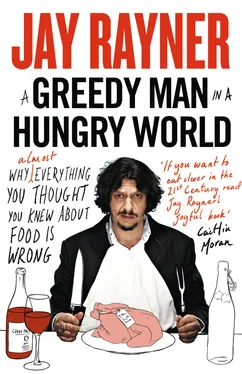Then 2008 happened. It happened like one of those awful slow-motion car crashes, with screeching tyres and the smell of burning brakes and the knowledge even as you watched it that nothing would ever be quite the same again. The causes were obvious and predictable, but still it took people by surprise: a bad harvest in Australia, a cyclone in the Bay of Bengal, a set of bizarre US government policies which then saw 20 per cent of the perfectly edible corn harvest being directed towards the manufacture of bioethanol (a policy which was meant to be impeccably green, but really wasn’t), those damn Chinese peasants getting a taste for beef that required seven kilos of grain for every kilo of meat produced, a hike in oil prices which, in turn, made petrochemical-based fertilizers much more expensive, the rise and rise of commodity trading. And then there was a failure to keep reserves of basic foodstuffs. Where once a nation might have four months of wheat backed up, in our just-in-time culture, meaning it is delivered only when needed, reserves have fallen to only a matter of a few days. All of these factors we will come back to in detail. What matters is the impact they had on food prices: they went up.
And up.
Between 2006 and 2008 the price of rice rose 217 per cent. Wheat went up by 136 per cent, corn by 125 per cent and soya beans by 107 per cent. Countries like Brazil, Thailand and India temporarily banned the export of certain varieties of rice. There were food riots all over the world, including in Bangladesh, Cameroon and Ivory Coast – and those are only the countries in the first part of the alphabet where there was civil unrest. In Mozambique people were killed in riots over the cost of food. Food prices would later be blamed for a second wave of civil unrest that started in Tunisia on 18 December 2010 and soon spread across the region in what was to become known as the Arab Spring. While events like the downfall of Colonel Gaddafi in Libya, the end of Hosni Mubarak’s thirty-year reign in Egypt, and the strife in Yemen and the civil war in Syria were clearly caused by a multitude of different competing pressures, there is a growing body of opinion that the one thing which united them was societal outrage over food prices.
Countries across the Middle East and North Africa had long suffered from low agricultural productivity and a huge reliance on imports, with governments attempting to placate their populace through endless unsustainable subsidies. The food price rises of 2007–8 simply pushed the situation over the edge. As David Rosenberg, a Senior Fellow on Economic Issues at the GLORIA Center, a foreign affairs think-tank based in Jerusalem, put it in a paper on the Arab Spring, ‘virtually all the countries of the region are contending with a food crisis of one kind or another’. It was a crisis so deep and intense and severe that it caused civil wars and overthrew governments.
And in Britain in 2008? That rich, Westernized, mine’s-a-prawn-ring-from-Iceland-for-£5.99-thank-you-very-much Britain? We felt it. We felt it like footballers feel a blown Achilles tendon. By August 2008 food price inflation was running at nearly 14 per cent. The cost of fat and oil had risen by 29 per cent, of meat by 16.3 per cent. This had begun to hurt. Finally the government began to wake up. New reports on food security were being published, declaring the challenges posed by a rising global population – expected to reach nine billion by 2050 – and by climate change potentially taking once productive slabs of land out of use. Suddenly Defra, a ministry which actually had the word ‘Food’ in its title, seemed to think that food production was important.
There was one issue, however, that they didn’t want to deal with: the bastard supermarkets. They didn’t appear anywhere in the equation. For years pressure groups and farmers’ representatives had been campaigning for some sort of ombudsman with real powers who could intervene in the relationship between the supermarkets and the producers to ensure a fair price was achieved, so that plum farmers didn’t grub up their trees. For years successive governments dragged their feet. The market was the thing. The market would see us right. A code of conduct was introduced, and yet there was no one to oversee it. In the run-up to the 2010 General Election the Liberal Democrats suddenly announced a policy for a grocery ombudsman, if they should win the vote. In what was looking like an increasingly close race, both Labour and the Conservatives followed suit, announcing various plans for a new body which would have some ill-defined powers.
After the Conservative–Liberal Democrat coalition came to power in May 2010, nothing happened. And then a lot more of nothing happened. The agriculture ministers in Defra made noises, said there would be a paper proposing a new ombudsman, just as soon as they had cleaned the oven and sorted through their sock drawer, or whatever else it is government departments do when they are stalling for time. In February 2011 I was invited to sit on a panel at the NFU’s annual conference, alongside Jim Paice MP, himself a one-time farmer and now agriculture minister. Asked to make some opening comments to the 750-strong audience, I pointed out that we were still waiting for news of a supermarket ombudsman, that the way things were going the bill wouldn’t be before Parliament for at least a year, which would mean it would be at least two or three years before any such office would be established.
Paice attacked me. He shouted me down like I was a stupid schoolboy, said the bill would be along within a few weeks, that frankly I didn’t know what the hell I was talking about. I was baffled. I hadn’t made it up: I had been talking to reporters on Farmers Weekly . I had been having off-the-record discussions with officials within the NFU who liaised with Parliament. Now it appeared I had got it wrong. It was a humiliating experience.
I hadn’t got it wrong. The first paper proposing a new ombudsman did not appear until late autumn of that year, and even then it was roundly attacked by everybody in the farming world for being nowhere near robust enough. As I prepared to address the NFU conference again in February 2012 there was still no news of when the bill would come before Parliament. And if the bill still hadn’t come before the House there was no way an ombudsman to oversee the supermarkets and make sure they didn’t screw the farmers could be established before 2013 at the very earliest. The supermarkets were free to carry on destroying the dairy, pig and plum industries. They were free to carry on undermining the agricultural base. They were free to carry on making Britain less and less self-sufficient.
Result!
A dull weekday afternoon, and I am running for my life. This is what I tell myself as my feet thud, like slimy, dead fish, on the treadmill. I am in the gym running to stay alive; or, more to the point, so that I can carry on living in a way which makes me happy. Lunch makes me happy. So does dinner. Being hugely overweight does not. As a result, three, four or sometimes even five times a week I am on the treadmill in my local gym beating out the miles. Or I’m in a brightly lit, reconditioned railway arch, being ordered to do strenuous things by an irritatingly cheerful personal trainer called Jonny. I pay to experience this pain. But then I am motivated. For good or ill, some of my working life now takes place in front of television cameras. I do not want to have to watch these appearances from behind a cushion, or feel the stab of childish hurt when somebody tweets about my ‘generous moobs’. As they have.
Run, fat boy, run.
There is one way of telling this tale which positions me less as culprit than as victim. In this version of the story it is the supermarkets, with their endless largesse, which have made me fat. It’s all their fault for being stocked with so much irresistible fat and sugar and general starchy carbs. In my case it’s simply not true. I have always been fat. I was a fat little boy and a fat adolescent and a fat twenty-something. In my house, when I was growing up, diets – as against diet – were a regular feature. There was one which required the eating of nine eggs a day and not much else. It made my breath smell of the entire world’s farts. I was 8 years old. There was another which applied units to foodstuffs and demanded endless counting and calculation so you didn’t exceed a daily total. I dieted in my teens and again in my twenties and thirties. Becoming a restaurant critic was not a turning point in my life. It was simply a coming together of greed and earning potential. I had always spent my own money in restaurants. I had always read restaurant reviews. Now I could write them too.
Читать дальше












